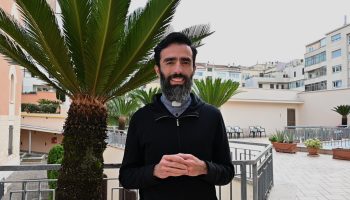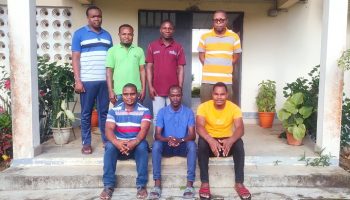
After two wonderful years of formation in my community of Kiełpin, doing a master at the UKSW, Cardinal Stefan Wyszyński University in Warsaw; and being ordained Deacon in the parish św. Małgorzata (St. Margaret) in Łomianki, I truly consider myself a son of Poland.
By Lucien Kana Sakimato *
As soon as I was ordained priest on August 17, 2024 in my home parish of Neisu in the Democratic Republic of Congo, I was appointed to go to Ivory Coast for my very first mission. Ivory coast! I hadn’t thought of that, but ad gentes always surprises us. Anyway it’s a French-speaking country like RD Congo, so it’s definitely one less challenge, right!!

Arriving in Kinshasa, the capital city of RD Congo, while waiting for the visa for the Ivory Coast, I was asked for an unexpected assignment, to take care of the parish of St. Joseph of Arimatheus because the parish priest had to go for his holidays. For a month and a half I served as parish priest in this very large parish. Full of zeal of a newly ordained priest, I started my pastoral activity at 5:20 AM, every morning celebrating the holy mass, meeting with Christians or visiting the sick of the neighborhood or blessing houses. Often until 11:00 AM without breakfast.
This assignment has taught me to sit and listen without the presumption of truly giving satisfactory answers to complex problems of faith, family or health. It has been more comforting to spend time listening than to be able to answer all their enquiries, even though at times the right answer would have helped. This time will always remain in my heart as an important moment of my formation.
I arrived in Ivory Coast on January 11, 2025, and soon after I was asked to serve in the parish of Marandallah in the north of the country. Here too the parish priest was on vacation, in Tanzania, only Father Isaac from Mozambique was present in the parish. My task is to accompany him in serving the large (from a territorial point of view) parish that has ten chapels located in the countryside.

ere, it is a real ad gentes mission. Especially due to the fact that the northern region of Ivory Coast is inhabited mostly by Muslims, who make up the majority of the country population; Christians are estimated to be 34%. Every morning at 4:00 AM, you can hear the Imam chanting with the loud speaker “Allah akubar”. The people of the parish territory speak the dialect “Senufo”, only about 30% speak French. While I celebrate the holy mass, there is always a catechist who translates my homily, and when I say the “Lord be with you”, the People respond in dialect “Nyinime taa wòlo na”.
A challenging and critical moment for me, newly ordained priest, was when for the first time a pious lady showed up asking for the sacrament of reconciliation, what to do!!! She was certainly happy to confess her sins, though the priest in front of her could not understand anything; after all what matters is faith more than anything else.
Yes, it is ad gentes, when the catechists who teach catechism do not receive holy communion; when the catechist who must read the word of God and translate the priest’s homily into dialect is not himself baptized perhaps because he is polygamous, but he is really very involved in pastoral work. It is ad gentes where many children do not know how to read or write because they are taken by their parents to herd the cows or work in the cashewnuts’ plantations. It is ad gentes when the local Muslim culture prevents women from speaking in public especially in front of men…
It is ad gentes when the small health structure of the parish lacks qualified health personnel. It is ad gentes when you travel many kilometers through rough roads to the chapels for the holy mass and the Sunday offering is not enough to buy petrol for the priest’s vehicle. It is ad gentes when they ask you when the fast of the day begins and ends, a feature of the Muslim Ramadan. It is ad gentes when they ask you if it is allowed to take the holy communion while fasting. It is ad gentes when on Sunday you have around ten people coming for mass, while the rest have gone with the children to collect the cashewnuts, as there is no school on Sunday.
Real consolation is the beautiful smile of a child or of an elderly person even though the language is a barrier, fortunately what unites is the language of the heart. It is always edifying and encouraging when, while being with people even for a short period of time sharing the same faith, you are tenderly given a name in the local language “Korona”, to say “Stay with us”. It is a wonderful experience the kindness of the Ivorian people who on the bus or in the restaurant they invite you to share their bread even if they do not know you. Yes, ad gentes always teaches us to go out of ourselves.

The most joyous thing is that we are not alone, “And behold, I am with you always, even to the end of the age.” (Mat 28, 20). It is very encouraging the availability and collaboration of the faithful in the initiatives of the parish, for example their prompt response to the pilgrimage to the “garden of friendship” as a Lenten exercise in preparation for the Easter festivities. Seeing 20 catechumens preparing to receive the sacraments of Christian initiation in the Easter vigil is a great joy and hope for the church.
This stage of my first missionary experience sounds as a call to conversion, that is, to understand that we are no longer in our Poland where we were used to a solemn liturgical celebrations with the splendid sound of the organ; also that we have no more easy access to basic services.
Again, I am called to understand that I am not in RD Congo where the churches are overflowing with Christians, but that I have to live my Christian testimony even among non-Christians, hearing ‘‘Allah akubar’’ every morning, rather than the sound of bells.
* Father Lucien Kana Sakimato, IMC, missionary in Sago, Ivory Coast.



